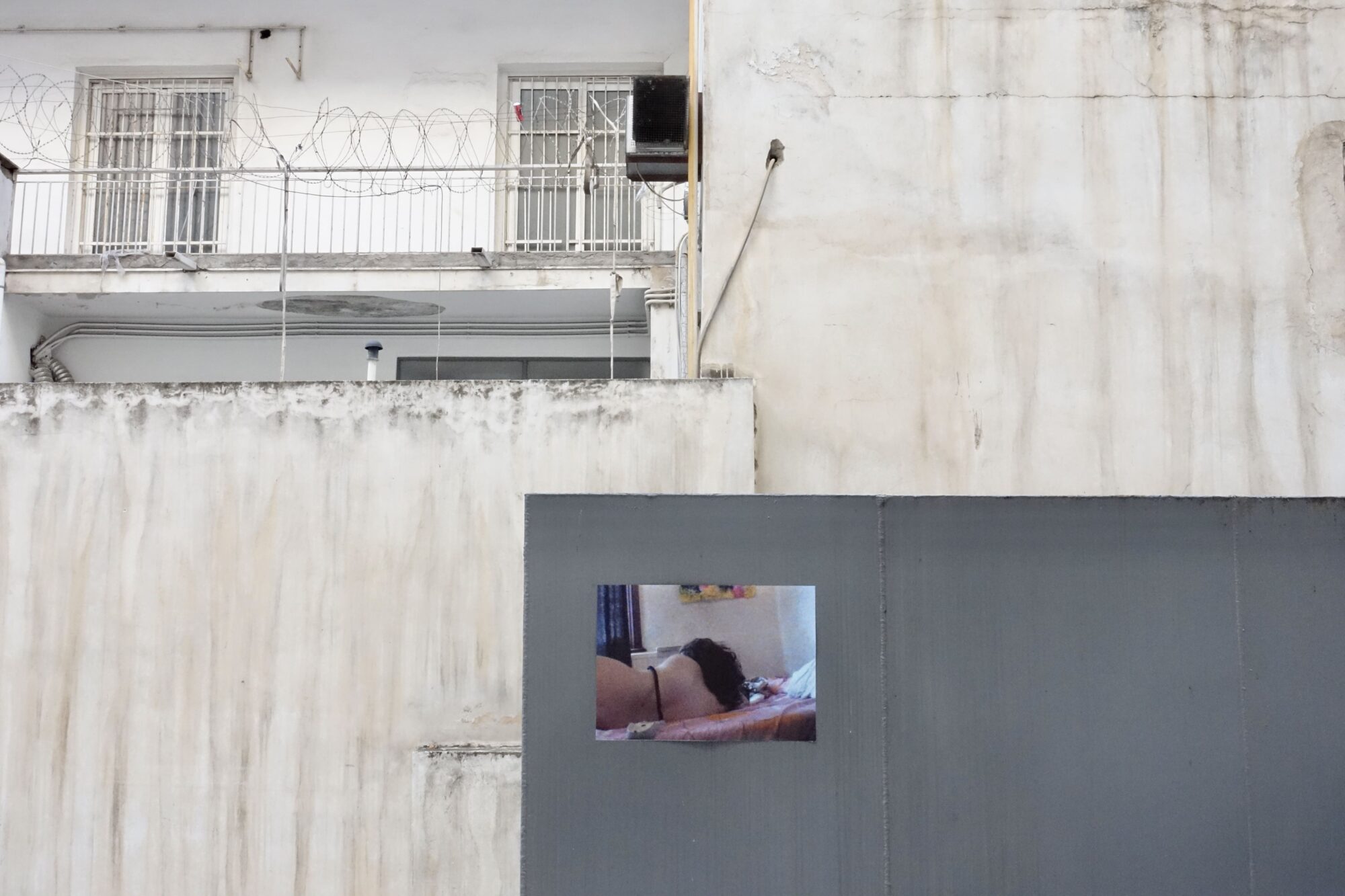AnnaMaria Pinaka. stay with me, I’ll give you jewls
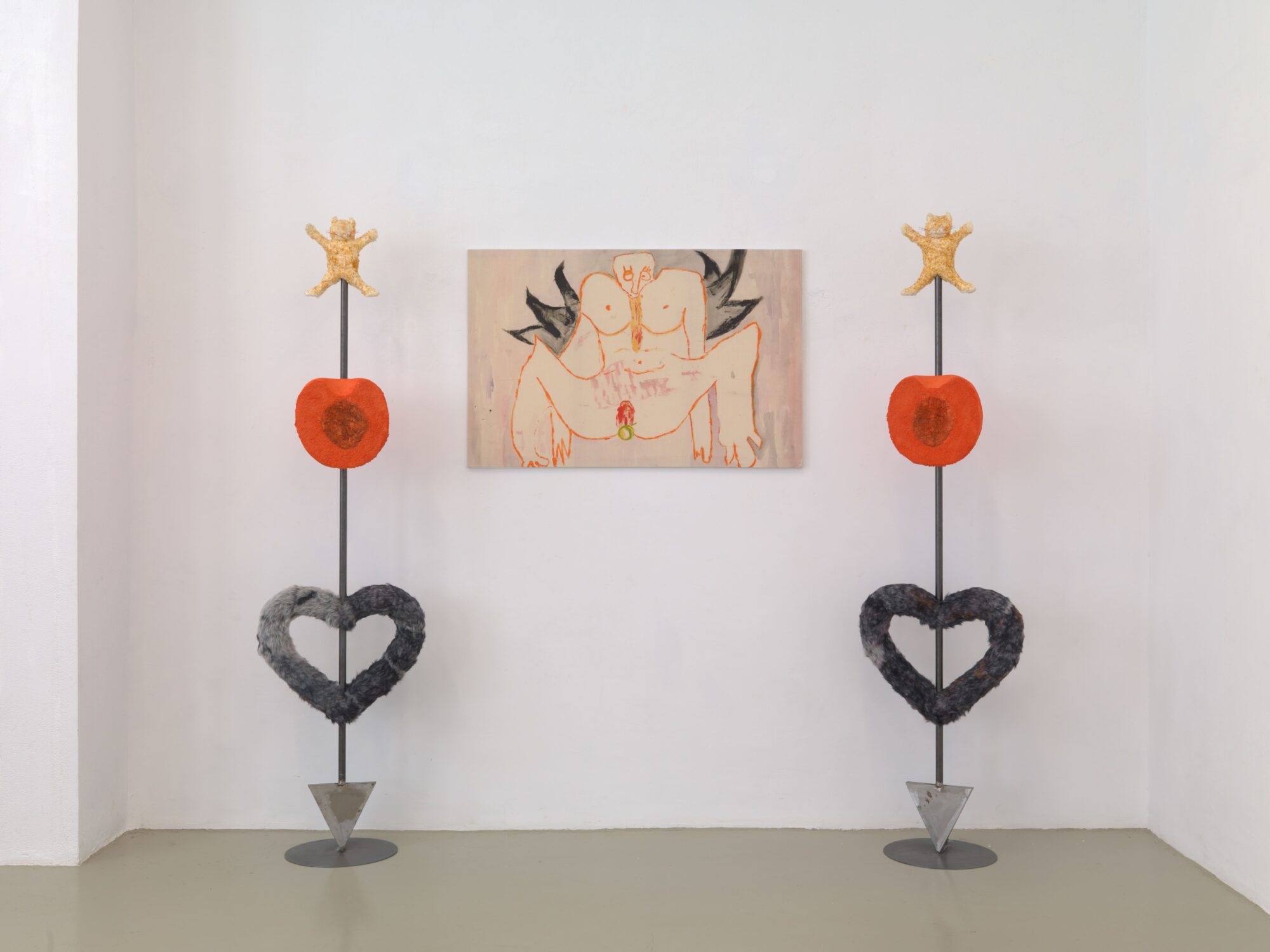
In celebration of today’s finissage for the exhibition “stay with me, I’ll give you jewls,” marking AnnaMaria Pinaka’s debut solo show within her native Greece, this review delves into the intricate tapestry of creatures, symbols, and languages that inhabit the artist’s poetics. Curated by Ioanna Gerakidi at Athens’ opbo studio, the exhibition serves as a gateway to a profound exploration of Pinaka’s body of work, offering insight into the various layers of subjectification and epistemic processes that the artist engages with.
I paint as if I were 7 years old, because that’s when I was told my painting sucks.
AnnaMaria Pinaka
In The Queer Art of Failure, penned by the notable queer theorist Jack Halberstam, the exploration of failure as a tool to challenge societal norms and expectations takes center stage. Halberstam posits that rather than pursuing success within traditional frameworks, embracing failure can serve as a unique form of queer resistance. This theme resonates deeply within the multimedia work of AnnaMaria Pinaka, an artist whose very first solo exhibition in her homeland is currently on view at opbo studio in Athens through October 28. On this occasion, Pinaka vividly portrays how embracing one’s inherent “wrongness” can serve as a wellspring of profound transformation, nurturing expression, sensitivity, and epistemological growth.
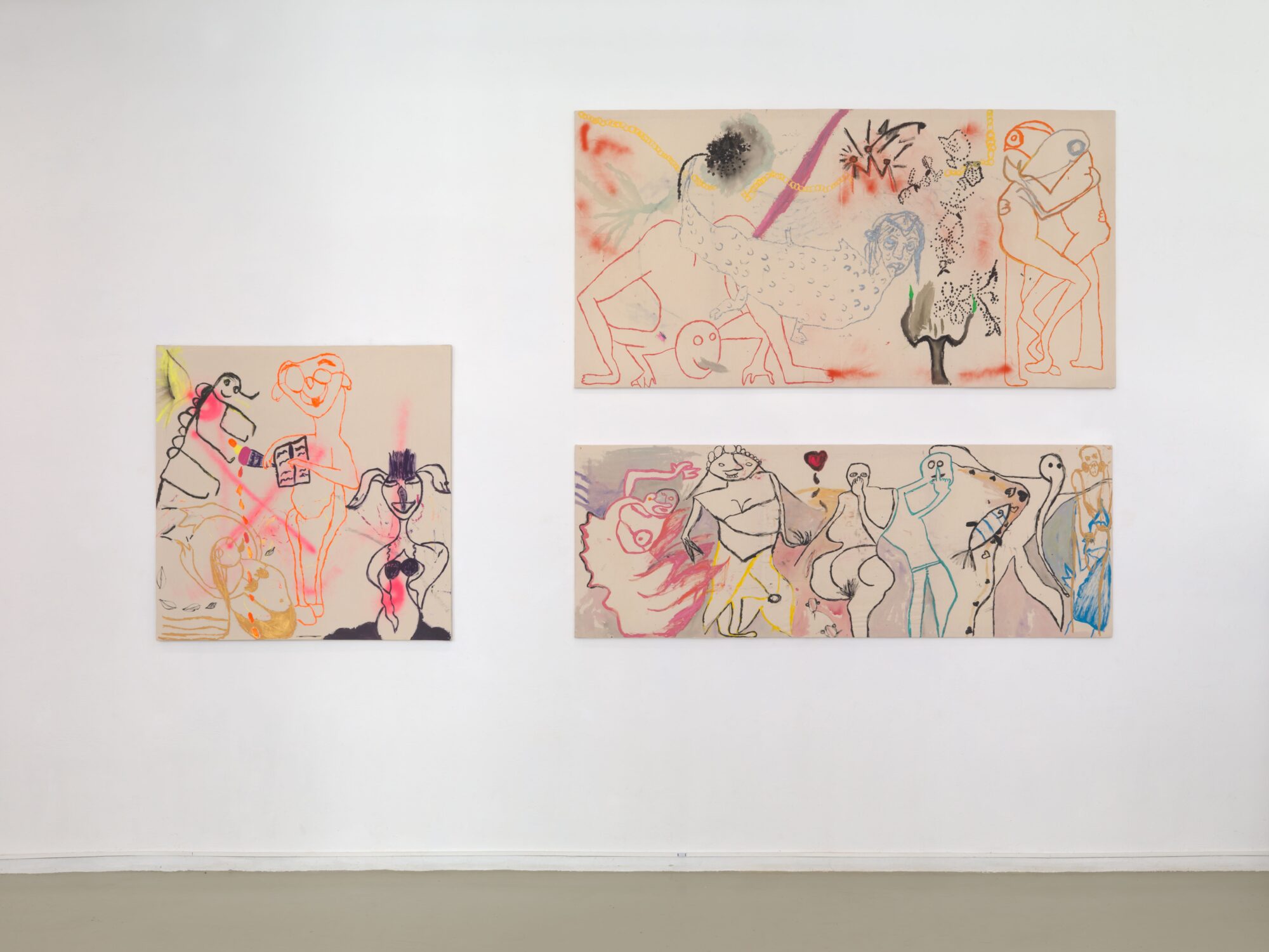 AnnaMaria Pinaka’s embodiment of “wrongness” unfolds as an epiphanic infestation of the pristine white cube. Using a diverse array of mediums, including paintings, drawings, posters, and sculptural works, Pinaka weaves a nonlinear metanarrative that dances on the fine line between the dirty and the whimsical. Guided by a troupe of demonic cicerones—figures of connection and blurring between the fantasy and the real—the viewer embarks on a journey filled with non-coincidental yet overlapping trajectories. Within this phantasmal odyssey, Pinaka extends an invitation—an autoethnography of the uncanny, where suppressed desires, sexual taboos, maternal narratives, femininity, and echoes of childhood re-emerge.
AnnaMaria Pinaka’s embodiment of “wrongness” unfolds as an epiphanic infestation of the pristine white cube. Using a diverse array of mediums, including paintings, drawings, posters, and sculptural works, Pinaka weaves a nonlinear metanarrative that dances on the fine line between the dirty and the whimsical. Guided by a troupe of demonic cicerones—figures of connection and blurring between the fantasy and the real—the viewer embarks on a journey filled with non-coincidental yet overlapping trajectories. Within this phantasmal odyssey, Pinaka extends an invitation—an autoethnography of the uncanny, where suppressed desires, sexual taboos, maternal narratives, femininity, and echoes of childhood re-emerge.
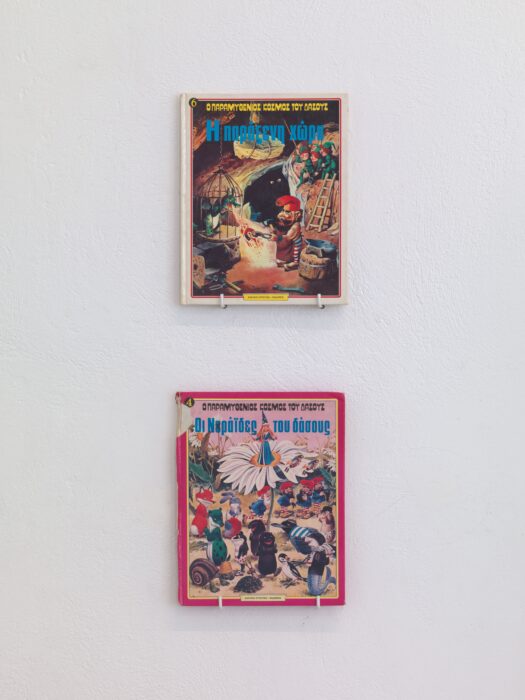 Far from orchestrating a solipsistic response, this poignant reclamation resonates on a human scale. Self-reflection and personal narrative unveil profound insights into cultural practices, behaviors, and lived experiences. Pinaka’s resurgence of juvenile rhythms and grammars does not entail a revival of cheerful and innocent games, nor does it rely on the crutch of nostalgia. Instead, it takes shape as a choreography of perversion, distortion, and subversion against stereotypes and fabricated myths. The outcome is a bestial polyverse suspended between the fairy-tale and the pornological, the familiar and the enigmatic, the engaging and the irritating.
Far from orchestrating a solipsistic response, this poignant reclamation resonates on a human scale. Self-reflection and personal narrative unveil profound insights into cultural practices, behaviors, and lived experiences. Pinaka’s resurgence of juvenile rhythms and grammars does not entail a revival of cheerful and innocent games, nor does it rely on the crutch of nostalgia. Instead, it takes shape as a choreography of perversion, distortion, and subversion against stereotypes and fabricated myths. The outcome is a bestial polyverse suspended between the fairy-tale and the pornological, the familiar and the enigmatic, the engaging and the irritating.
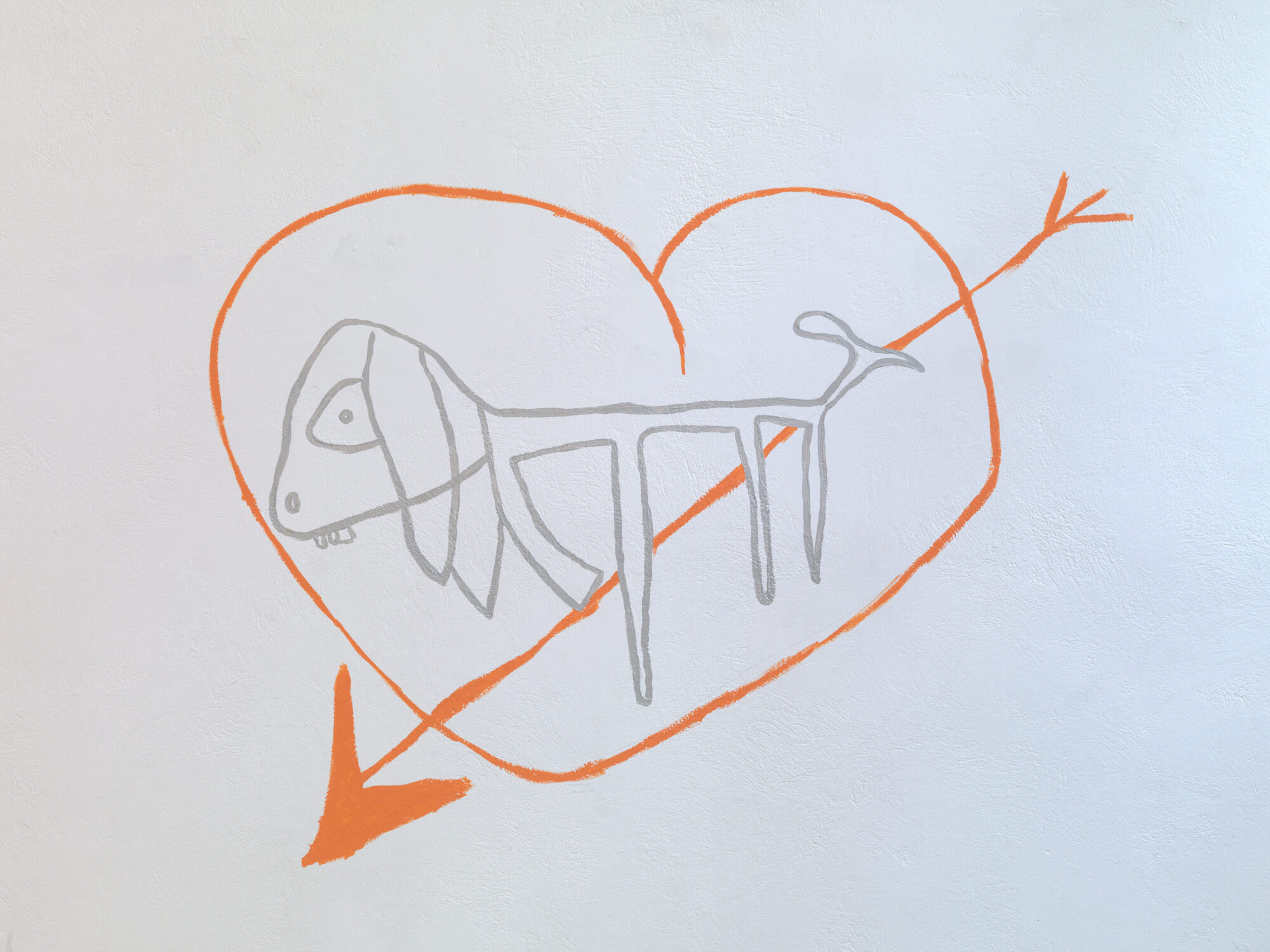 Much like an illegitimate offspring of Leonora Carrington and a kindred spirit of Georges Bataille, Pinaka, through her autoethnography, confides a relational urgency that dwells somewhere amid the tender and the hardcore. “stay with me, I’ll give you jewls“ serves as both an invitation and a deceit, encouraging coexistence in a paradoxical realm without the compulsion to reconcile it. Pinaka’s cry is a deliberate resistance to the dialectical allure of synthesis and order, opting instead to embody, practice, and nomadically experience the contradictions.
Much like an illegitimate offspring of Leonora Carrington and a kindred spirit of Georges Bataille, Pinaka, through her autoethnography, confides a relational urgency that dwells somewhere amid the tender and the hardcore. “stay with me, I’ll give you jewls“ serves as both an invitation and a deceit, encouraging coexistence in a paradoxical realm without the compulsion to reconcile it. Pinaka’s cry is a deliberate resistance to the dialectical allure of synthesis and order, opting instead to embody, practice, and nomadically experience the contradictions.
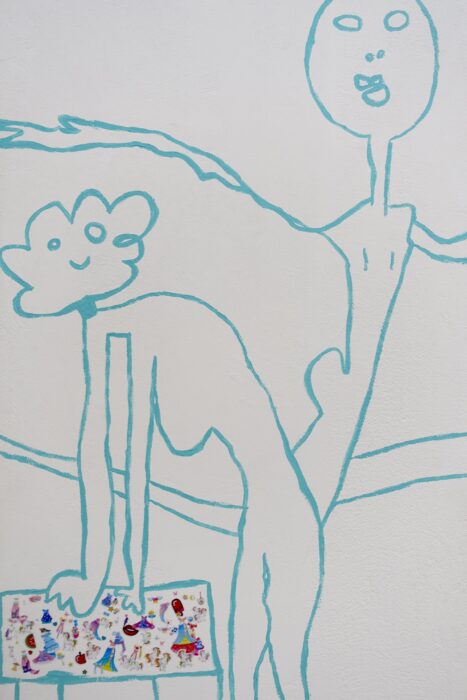 Her demons evade confinement within neat categories, wholeheartedly embracing the tumultuous, the equivocal, and the quotidian facets of existence. Rather than conceal ambiguity and abjection, they lay them bare for all to witness. These mischievous beings appear to surface from ephemeral, marginal, and unrestrained shadowlands, spared from the captivity of self-awareness—those elusive moments when one exists without direct consciousness of self. They laugh, read, fuck, weep, and perform. Hovering on the threshold between two worlds, they inhabit formlessness both on the wall and canvas, coexisting with other portals of symbolic connection, including storybooks and wrought-iron neo-obelisks (from the Greek obelos, meaning “spit”). At a calculated distance, expanding the realm of haunting in the open air, Pinaka’s body eerily materializes in the form of a poster depicting her from behind, a still from her video performance series aptly titled All the Things I Like.
Her demons evade confinement within neat categories, wholeheartedly embracing the tumultuous, the equivocal, and the quotidian facets of existence. Rather than conceal ambiguity and abjection, they lay them bare for all to witness. These mischievous beings appear to surface from ephemeral, marginal, and unrestrained shadowlands, spared from the captivity of self-awareness—those elusive moments when one exists without direct consciousness of self. They laugh, read, fuck, weep, and perform. Hovering on the threshold between two worlds, they inhabit formlessness both on the wall and canvas, coexisting with other portals of symbolic connection, including storybooks and wrought-iron neo-obelisks (from the Greek obelos, meaning “spit”). At a calculated distance, expanding the realm of haunting in the open air, Pinaka’s body eerily materializes in the form of a poster depicting her from behind, a still from her video performance series aptly titled All the Things I Like.
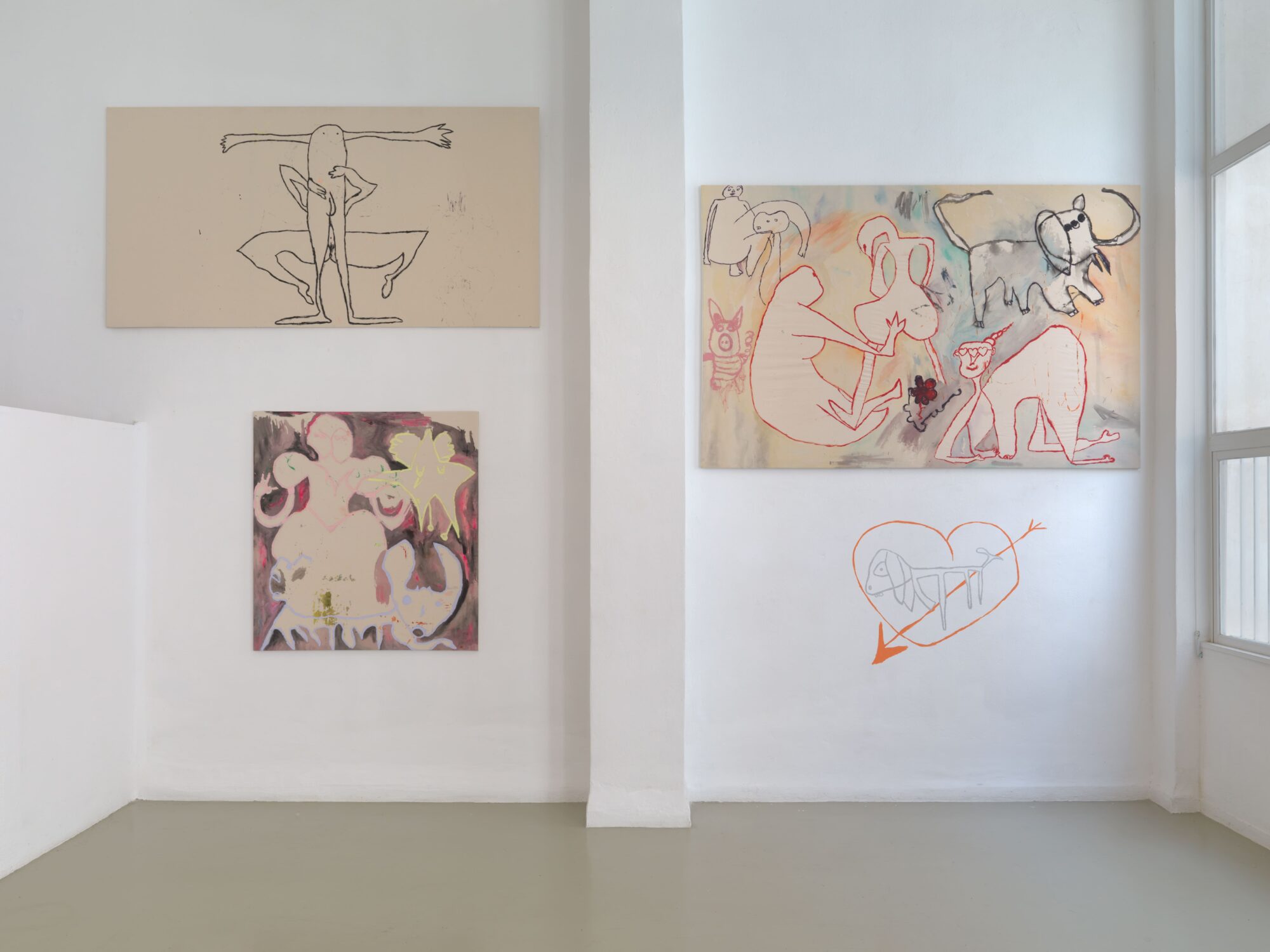 Through this exhibition, Pinaka boldly confronts the very notion of identity, resurrecting and reinforcing a relational comprehension. She employs modest, wretched, unrefined, fragments from her personal life and sexual dynamics as a maieutic instrument to probe the inner and outer tensions stemming from the performance of her subjectivity. In this distinctive approach, she exemplifies an artistic methodology she has herself coined through extensive, practice-based academic research—porno-graphing. Just as Halberstam does on a theoretical plane, Pinaka, at the artistic level, “provoke, annoy, bother, irritate, and amuse.” She unmistakably subscribes to the idea that making a difference involves “chasing small projects, micropolitics, hunches, whims, fancies,” and sharing them widely.
Through this exhibition, Pinaka boldly confronts the very notion of identity, resurrecting and reinforcing a relational comprehension. She employs modest, wretched, unrefined, fragments from her personal life and sexual dynamics as a maieutic instrument to probe the inner and outer tensions stemming from the performance of her subjectivity. In this distinctive approach, she exemplifies an artistic methodology she has herself coined through extensive, practice-based academic research—porno-graphing. Just as Halberstam does on a theoretical plane, Pinaka, at the artistic level, “provoke, annoy, bother, irritate, and amuse.” She unmistakably subscribes to the idea that making a difference involves “chasing small projects, micropolitics, hunches, whims, fancies,” and sharing them widely.